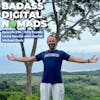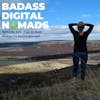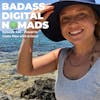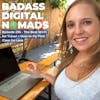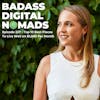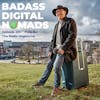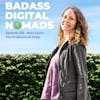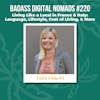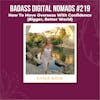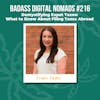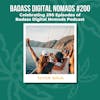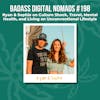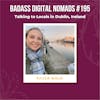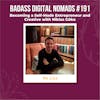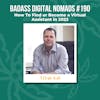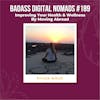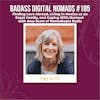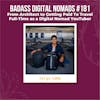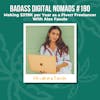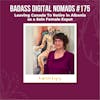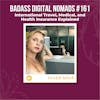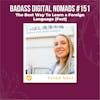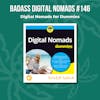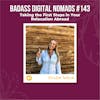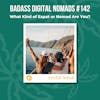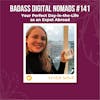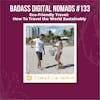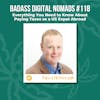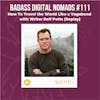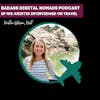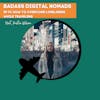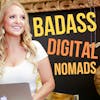5 Reasons Why 2021 Is the Best Time to Become a Digital Nomad

2021 will be the best time in history to become a digital nomad! Here are five reasons why. Want to become a digital nomad in the upcoming year? Apply for a free strategy call with Kristin to discuss your plans at: travelingwithkristin.com/freecall
2021 will be the best time in history to become a digital nomad! Here are five reasons why.
Want to become a digital nomad in the upcoming year? Apply for a free strategy call with Kristin to discuss your plans at: https://www.travelingwithkristin.com/freecall
If calls are fully booked, email hello@travelingwithkristin.com for more availability.
SHOW NOTES & RESOURCES
- Kristin's Remote Work Amazon Store
- Medium: 12 Ways the World Will Change When Everyone Works Remotely
- Traveling soon? Make sure you have:
.......................................................................................................
Support the Badass Digital Nomads Podcast:
- Become a Patron for $5 per month
- Leave a 5* Review: https://lovethepodcast.com/digitalnomad
- Buy Official Merch
Connect on Social Media:
- Follow on Instagram
- Subscribe to Traveling with Kristin on YouTube
- Subscribe to Digital Nomad TV on YouTube
- Join the Badass Digital Nomads Facebook Group
Podcast descriptions may contain affiliate links of products and services we use and recommend at no additional cost to you.
Introduction: Welcome to Badass Digital Nomads, where we're pushing the boundaries of remote work and travel, all while staying grounded with a little bit of old school philosophy, self-development, and business advice from our guests.
Kristin: 00:00:23 Hello, hello, Kristin from Traveling with Kristin here. Welcome to episode 85 of Badass Digital Nomads, and I'm coming to you directly from my new closet. Luckily it's a walk-in closet, so I'm not squished into the corner <laugh> like before. But um, yeah, I just finished a two day move to a new apartment just down the street from my old Airbnb in Miami. And uh, moving, it's always such a headache, but it's also so cathartic. It's so good to throw things away and I'm already an extreme minimalist, but it was, uh, nice to go through and get rid of more stuff. And you know, even though I have been a digital nomad for a long time, I always notice whenever I'm slow traveling and staying in one place for a few months at a time, I end up accumulating stuff. And I think that's just natural.
Kristin: 00:01:26 So if you don't, if you don't keep an eye on things, it can happen. So I am really happy to be settled here. I'm gonna hang out in Miami and enjoy the nice perfect weather that we're having through the winter. I've never been in South Florida in the winter, but I like to think of myself as a digital nomad snowbird. So that means some years I go, I head south for the winter, I go south of the border and spend it in Mexico or Costa Rica or somewhere like that. And other years, like I have been the past four years, I have spent the winter at a ski resort in either Colorado or Canada or Japan or Bulgaria or the French Alps or somewhere like that. But this year not really happening, but that's okay. We'll switch from snow to the tropics. So I hope that you're doing well.
Kristin: 00:02:25 As we head into the middle of the last month of the year, I wanted to talk about plans for 2021. And if you're listening to this episode in the future, like after 2021, think of it as a episode to listen to if you're thinking of becoming a digital nomad in the next year, whatever year it might be that you're listening. The reason that I wanted to do this now is because it's been such a different year and travel has been quite restricted or if not frozen and a lot of people have been staying home. And so now that there is a vaccine that's being distributed and most people should be able to access it by summer of 2021, I think it's safe to assume that the latter half, at least maybe after the first quarter of 2021, will be a lot different than the past year that we've had.
Kristin: 00:03:29 So I wanted to give you some of my tips of what to expect and kind of my predictions for the next year and why I think it is a great time from 2021 and beyond to become a digital nomad. I also saw a video this week by Matt D'Avella the YouTuber. I don't know if you've watched some of his videos. He has I think, millions of subscribers. But I saw a video that he is moving to Australia with his wife and, um, one of my friends and his fiance just recently moved to New Zealand. So people are making moves, um, for all different reasons and have been throughout this year, but it's just going to increase and now is a good time for people thinking of 2021 travel relocation, digital nomad plans because in my past nine years, nine and a half years, <laugh> at least nine years, helping people relocate to different countries.
Kristin: 00:04:37 Really the sweet spot for starting to plan a relocation, like actively planning it, you know, searching for housing, putting your budget together, setting a timeline, it's a good three or four months in advance of your actual departure date. So whereas people contact me and are in touch with me sometimes for five years, seven years before they actually make the move, once you've made that decision that you're ready to do something and go somewhere three or four months is a really good timeline to work backwards from anywhere up to six months. But beyond six months, it can still feel too out there. Like it's not tangible enough and not realistic enough. So listen even more closely <laugh> if you have a six month or less, uh, target move date. I also have a really exciting announcement, something that I've never done before. And I am going to be offering for the first time free one hour strategy calls to a limited number of people who want to become digital nomads in 2021 or expats.
Kristin: 00:05:55 Like if you wanna move to a different country to work remotely. So if you're listening to this in December of 2020 and possibly into January, check the link in the show notes or go to travelingwithKristin.com/freecall to apply. So this is for people realistically think that they will want to make some moves within the next six months. So many of you know, because many of you have booked consulting calls with me that my normal rate is 350 an hour. So this is the first time that I'm giving away free calls. So this is actually the first time that I'm even announcing it on this podcast. I'll probably tell people in the Facebook group, but I don't know how public I'm gonna make it probably just for patrons, uh, people in the Facebook group and people who listen to the podcast, we'll get, um, access to book one of these free calls.
Kristin: 00:06:53 So get on it if you wanna get some free advice. And again, that is at travelingwithKristin.com/freecall and it's K-R-I-S-T-I-N. Somebody left a comment on YouTube the other day with Kristin with an EN and then he corrected it. He's like, oh, sorry, Kristin with an IN so thanks for that. Okay, so I have five main reasons for you that 2021 and beyond is a great time to seize the day and become a digital nomad. Now I'm using that term loosely. It doesn't mean that you have to be fully nomadic for the rest of your life with no home base, but it's a sliding scale. You can be nomadic sometimes you can have a home base, you can slow travel. Do you just, you know, becoming location independent is what we're talking about. That's the goal. So the first reason is the pandemic, basically the pandemic shift to remote work.
Kristin: 00:07:55 I wrote an article in 2019 on Medium, about 12 predictions of what would happen when everyone worked remotely. And I wrote that article thinking that these things would unfold in the next 10 years. And a lot of them happened this year, <laugh>. So we have so many more tools now, so many more remote work tools. Silicon Valley, everyone is thinking about remote work. Everybody is innovating around remote work. It has permeated every industry on the planet and there has been this explosion already of innovation to help people work remotely better, faster, easier, more comfortably communicating with your team, managing projects, working across time zones. Like so many things, it's actually impossible for one person to just keep up with all the different things coming out every day. Pieces of software, apps, you name it, uh, hardware. So there's so much tools and technology now to support remote workers.
Kristin: 00:09:03 And there's also been a shift, like a collective shift in accepting the reality of working remotely, working from home or being nomadic. So before the pandemic there was way more resistance towards making this transition, but now there's been this collective acceptance that this is a thing, that all of these are things and there's been a shift in corporate culture that's also more accepting because they had to be <laugh> so they didn't want to be. But now so many companies are permanent work from home or permanent remote work. And so it's just like this whole new world is open up for people, not just physically that they are allowed to physically leave their office, but the mindset block that was there, and I'm not just talking about individual people, but the societal block, that that wasn't possible or that this lifestyle was a pipe dream that is crashing down.
Kristin: 00:10:11 It is surreal for me to think that I will never have to explain probably ever again what I'm doing in my life. Like what a digital nomad is, what remote working is so many times, countless times to date before the pandemic, just explaining to people that I didn't live anywhere or that I could work from anywhere or that I was just pa passing through, just traveling. This was like a daily conversation that I would have when I met people with like the normal small talk and that it's like everyone just gets it now. And so there's gonna be so much collective support, like, like this global digital nomad tribe, but also just the nod from other people that they get what you're doing and that help can help you stay motivated because it's like you're not going against the grain. You're not such an outlier anymore.
Kristin: 00:11:09 It's like more accepted. There's also going to be more coworking, more co-living, more infrastructure for all types of digital nomads, remote work retreats, like everything will be available at your fingertips. All of the things that I wish we had 10 years ago, we will have in 2021 and beyond. So it's super exciting. The other most exciting thing this, so the second thing, the second reason is because of all of the digital nomad and remote work visas, this is another pipe dream, something I wrote about in 2019 that governments would start to compete for remote workers instead of trying to attract companies, they would be trying to attract individuals. And again, I was thinking 10 to 15 years out before it would be mainstream, but I also wrote that there would be a, a tipping point where when enough countries had some sort of remote work program, everyone else would adopt it.
Kristin: 00:12:14 And that is exactly what we saw this year. And it happened so fast. We went from one to two digital nomad visas, Barbados to Estonia to almost 20 within a matter of months and more and are rolling out every week. It's like this week was Greece and there's just so many. So I have a lot of videos <laugh> on all the different digital nomad visas. Not all of them. Mauritius launched a digital nomad visa. Like I think every country in the world will have some form of digital nomad or remote work visa or incentive program probably in the next couple of years. So that makes this such a great time to be a digital nomad. I also want to point out that before the digital nomad visas, you would have to spend a lot of money to be able to get the privilege of staying in a country for longer than just a few months on your passport.
Kristin: 00:13:16 And that would come in the form of a work permit or getting a sponsor or applying for dual citizenship. And now the digital nomad visa is kind of like a permanent residency citizenship light version of that, but it's basically free in most cases. Or it only costs a couple hundred dollars to apply at most, a couple thousand dollars to get permanent residency. In Costa Rica, for example, which is one of the cheapest places in the world, you would have to deposit a lump sum of like 60 or $80,000 in the bank for five years to be able to qualify for permanent residency. In many countries you have to spend tens of thousands of dollars to open a business or to buy real estate. And so this is a huge opportunity for people who want to travel and basically become expats but don't want to switch countries so often.
Kristin: 00:14:14 And along those lines, the third reason why now is going to be a great time to become a digital nomad is the lower cost of travel, at least temporarily. So one of the things that I've done over the past many years is travel during off peak times and travel during shoulder seasons. So what do I mean by that? There are just like rush hour, there are peak times of travel holidays when school gets out, summer vacation, these sorts of things. And then there are also peak travel destinations during those times. So in the winter people go where it's warmer, um, they go to ski resorts, there's like specific hot spots where people go at different seasons of the year. So in the winter, everyone from New York goes to Florida or everyone from Florida goes to Mexico or from Canada to Costa Rica. So there's these sort of seasonal patterns that happen.
Kristin: 00:15:19 But with the pandemic, not only are fewer people traveling for obvious reasons, but I think that that will linger into the next year at least, um, where there's going to be lower occupancy, less people traveling, more travel deals, and there also won't be those big spikes in prices and rates during the peak times of year, like summer in Europe, for example. So you're going to be able to find deals throughout the year temporarily in places that have never had deals at that time. Like this year, I know people have been getting crazy travel deals because of the low number of people traveling. So in 2021, you should be able to safely travel and take advantage of the lower rent prices, the lower airfare, the lower hotel rates, like so many things that probably will never happen again for the rest of our lives, <laugh>. So let's take advantage of that.
Kristin: 00:16:25 Also with remote learning, there's not going to be as many peak times for when kids are out of school because less people are going to be in physical school from now on. So there's a lot of changes happening, but it is a good time to go nomadic. The fourth reason I have here is the increase in fun <laugh>. Okay? So I started a relocation company in 2011 because I wanted more expat friends. I wanted more foreigner and like-minded people to move to where I was living in Costa Rica. So I noticed that the expat community where I was living at the time, it was in the Central Valley of Costa Rica, was quite transient. So I would make friends with people then they would leave after a few months or a year or a few years. And I started in Costa Rica. I started living full-time there in 2005.
Kristin: 00:17:26 And it had gotten way easier by 2010, like to work remotely and work from anywhere in Costa Rica, like the technology just from 2005. We went from no iPhones to like Instagram by 2010. And and so there was just, it was so much easier to work. And so I wanted to attract more people to where I was living selfishly so that I could meet more people and that I could share the lifestyle with more people my age because it was a lot of retired people and I was just in my twenties. So I opened this relocation company and started helping people from 18 years old. Well, I thought it was gonna be like 18 to 35. It ended up being from 18 year olds who were going from college into playing online poker full-time and wanted to live in Costa Rica where they could play legally. And they didn't have to wait until they were 21 up to crypto investors around 2011, 2012.
Kristin: 00:18:33 Got a lot of bitcoin millionaires, <laugh>. And then from there it went all the way up to I think my oldest person relocating was 85 years old who had multiple income streams like social security and his pension and things like that. So I started thinking of bringing more people in like my, in their twenties and thirties down. But then it ended up being people of all ages. But the moral of the story is that now millions more people have entered the remote work economy, the work from home economy, the digital nomad lifestyle. And so it's going to be so much more fun. Like it's al it always was fun. Okay, this lifestyle of travel has always been fun, but now that there's so many more people, even if it's an increase of 5% more, one, one to 10% more, let's say that's a lot more people and that's a lot more potential.
Kristin: 00:19:36 Friendships, relationships, business partnerships, acquaintances, masterminds, brainstorming parties, conferences, events, like so many cool things are going to be happening. And you don't wanna have fomo, <laugh>, you don't wanna have fear of missing out. So yeah, this is basically unprecedented that so many people will be allowed by their jobs to at least work remotely some of the time or travel a few months a year versus one week per year or two weeks per year. And, uh, so many more people will have transitioned to, um, just working for themselves. And so we're about to have, we already have way more digital friends online, but we are about to be able to meet many more people in real life that previously were excluded from this lifestyle for a variety of reasons. And so that is another reason why I think it's a great time to get out there and travel the world.
Kristin: 00:20:40 And then the fifth reason, and this is the most important one actually, is time. Time and timing. Timing obviously is better than it's ever been. Well after, after the pandemic, you know, <laugh>, I'm thinking like with vaccines being rolled out worldwide right now or about to be rolled out, once this pandemic is under control, it'll be like a remote work renaissance. So even though as of December, it's definitely not the best time to be going around and traveling as cases are spiking and records are being broken in the US and other countries. But after that passes, hopefully we go into a period of just a boom and abundance and we will see what happens. Because the last time there was a pandemic, it was over a hundred years ago and technology was a lot different, mindset was a lot different, culture was a lot different.
Kristin: 00:21:41 Gender roles were a lot different. Race relations were a lot different. Now is the permissionless economy. You live how you want, you live on your terms. You do you, and you don't have to ask anyone, you just act first. Ask forgiveness after. No, you don't have to ask forgiveness for living life on your own terms. And so it's never been more available than it has been in in the past. And so it's good timing. But also one thing that the pandemic has shown is that we don't have unlimited time to do all of the things that we want in the world. We never did <laugh>, we just globally, we all kind of felt more invincible, right? We didn't understand the potentiality of this type of pandemic unless you were a scientist or an epi, epi epidemiologist, I don't know how to pronounce that word. <laugh>.
Kristin: 00:22:45 So what I'm trying to say is that you're going to die someday. We're all going to die someday. And hopefully after this experience, none of us have taken our health for granted, have taken our mobility for granted, our freedom for granted, our jobs for granted, and we don't have an unlimited amount of time to be able to do the things we want to do. And those things that we have on our bucket list can be taken away in an instant. I know a lot has happened this year, but there was a period where the, like us passports were essentially worthless. Like even though I wasn't trying to travel internationally, the idea that I couldn't travel was weird <laugh>, because it has, I've never been cut off like travel or I've never been cut off from travel like that overnight. And there was a lot of uncertainty during this year, especially without the vaccine, if travel would ever reopen the way it was before.
Kristin: 00:23:59 And we still don't know that. We still don't know what the future holds for travel, what the restrictions will be if you'll need to have like a covid passport, if we'll ever have the kinds of, uh, freedoms that we had or socializing that we had before. Like everything is still really uncertain. But the question that I have for you is how can you shrink your 10 year plan into one year? Think about that because a lot will change in the next 10 years, for better or worse. We don't know. Things that happen in life are objective. We attribute meaning to them. But let's start thinking about things with more urgency. Let's enjoy the moment. Let's enjoy life, let's take care of ourselves, let's pace ourselves. But let's not wrongly assume that we have unlimited time to do the things that we wanna do, to go the places that you wanna go.
Kristin: 00:25:03 So time and timing, we are in a challenging time right now facing humanity without a doubt. But on the other side of that challenge is opportunity. And if you want to seize that opportunity, now is the time to be thinking about that. And obviously taking precautions, but thinking about how you can shrink and collapse your timeline for your goals to take action sooner and reach them faster. I have to also put a caveat that doesn't mean that the goal is the destination, like the journey is the destination, the journey to, to reaching that goal. But there was a, a couple that I had when I first started working in real estate in 2005, and they were retired or retiring and they were looking at properties to invest in and to move there. They wanted to live out their retirement in Costa Rica. Um, I remember showing them so many properties and they never made a decision.
Kristin: 00:26:13 I showed them properties for two and a half years and I wasn't the only one. There were other realtors in the same town that were also showing them properties. I think they had seen every suitable property that they could afford in the town over the, that time period. And they just kept looking and looking and looking fast forward to 2017. So from 2005 to 2017, I had already left Costa Rica in 2012 to go fully nomadic and just travel around the world. But I would still come back to Costa Rica once a year just to visit. And I was still working there. I'm still working there to this day. I was on a road trip from Tamarindo in the northwest corner of Costa Rica down to Nosara. This is a trip I've done so many times. I've done it on four wheelers and all different types of vehicles.
Kristin: 00:27:11 So I go on this great road trip, I I get to my friend's house, which actually I made a video about it. This was right when I bought a camera and started documenting my travels. And so I made a video about the house she was living in, which was a tree house container house. And then we went up to have a coffee with a view of the river mouth, um, the Boca Nosara river mouth. And um, we run into this couple on the street and they recognized me and they're like, Kristin, and I'm like drawing a blank on their names right now. I don't wanna call them out anyway. And I was like, oh my gosh, hi. And they're like, oh, are you still living here? And I was like, no, I'm just visiting. And I'm like, what are you guys up to? Are you just visiting?
Kristin: 00:28:02 And they're like, no, we bought a house here. I was like, really? And they're like, yeah, you wanna come see it? So we go to see it. It was great. It was right near the river mouth. Oceanview, you guys, they looked for houses for nine years. So when I was there, it was 12 years later after I started showing them properties, they looked for nine years. Think about that. So they had only been living there for like three years maybe because by the time, like they're closing on the property, it could take months of due diligence and then moving in, et cetera, et cetera. They could have been living in Costa Rica for 10 years, 11 years. They had only been there for a couple years because they spent nine years looking for the perfect property. You guys, <laugh>, we don't have that luxury anymore. Do not spend nine years on a plan for something that might never happen.
Kristin: 00:29:02 So they could have rented a house in Costa Rica, lived in all different corners of the country over the course of nine years, and yet they waited for the perfect house. Eventually. Did they get their perfect house? Maybe, but was it worth waiting that long? And they didn't see it that way, but at that point I had been to more than 50 countries and I was just like, you know, they, they could have lived in Costa Rica and, and changed houses, you know, stayed in one house for a few years and then another one. And so this pandemic has brought forth the reality that we don't have all the time in the world. We don't have unlimited time. So I would just urge all of you to ponder that thought. How can you achieve your 10 year goals in one year? How can you take action on something that is in your 10 year plan this year or in the next year?
Kristin: 00:30:05 Okay, so let's just recap those top five reasons for you really quickly. The first one is the pandemic slash paradigm shift to remote work. The second one is the proliferation of digital nomad visa and remote work programs. The third reason is the, at least temporarily lower cost of travel and less seasonal peak fluctuation in compared to what we're used to in the past. The fourth reason is fun being able to have so many more opportunities to meet people than wherever possible before. So many unique and creative digital nomad and remote work types of programs, events, co-working, co-living. All sorts of things should be coming out of the proverbial woodwork in the next few years. And the last one is timing and time. The timing has never been better to become a digital nomad. And the time is limited. <laugh>, the time is now. We don't have forever. So let's take action as soon as possible. So I hope that this helps motivate you for your 2021 goals and beyond. And remember, if you'd like to apply for one of the free strategy calls I'm giving out to aspiring digital nomads, check the link in the show notes or go to travelingwithKristin.com/freecall. See you guys next week.
Kristin: 00:31:51 Thank you so much for listening. And remember to leave a review for the podcast wherever you listen and share this episode with someone you think it might help.
Kristin: 00:32:03 And to further support the podcast, plus get tons of access to exclusive behind the scenes content. Consider becoming a Patreon patron for just $5 per month. You can enjoy early access to preview my YouTube videos, get exclusive Patreon posts and personal updates that I only share on Patreon. Join my private monthly live streams and live q and as and get behind the scenes access to private, unlisted live podcast interviews or Zoom video recordings that are only available to my patrons. You also get the ability to vote on upcoming videos and podcast guests and can submit your questions for our guests directly. You'll also get discounts on merch and swag and many more surprises on deck throughout the year. And again, you can become a patron for just $5 a month at patreon.com/travelingwithKristin. That's P-A-T-R-E-O-N.com/travelingwithKristin; K-R-I-S-T-I-N. And thank you for your support.
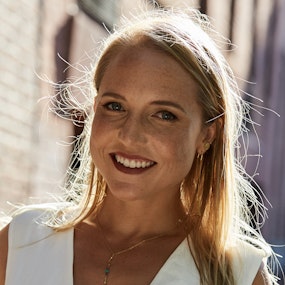
Kristin Wilson
Host of Badass Digital Nomads & YouTube's Traveling with Kristin / Author of Digital Nomads for Dummies
Kristin Wilson is a long-term digital nomad and location-independent entrepreneur who has lived and worked across 60 countries in 20 years. Since founding a fully-remote, international relocation company in 2011, she has helped more than 1,000 people retire or live abroad in 35 countries. Today, she helps aspiring remote workers, digital nomads, and expats achieve their lifestyle goals through her YouTube channel (Traveling with Kristin) and podcast, Badass Digital Nomads.
Kristin is the author of Digital Nomads for Dummies. She's also a Top Writer on Medium and Quora in the topics of business, travel, technology, life, productivity, digital nomads, and location independence. She has been featured on The Today Show, Bloomberg Businessweek, Business Insider, ESPN, The New York Times, WSJ, Huffpost, HGTV’s House Hunters International, and more.


























